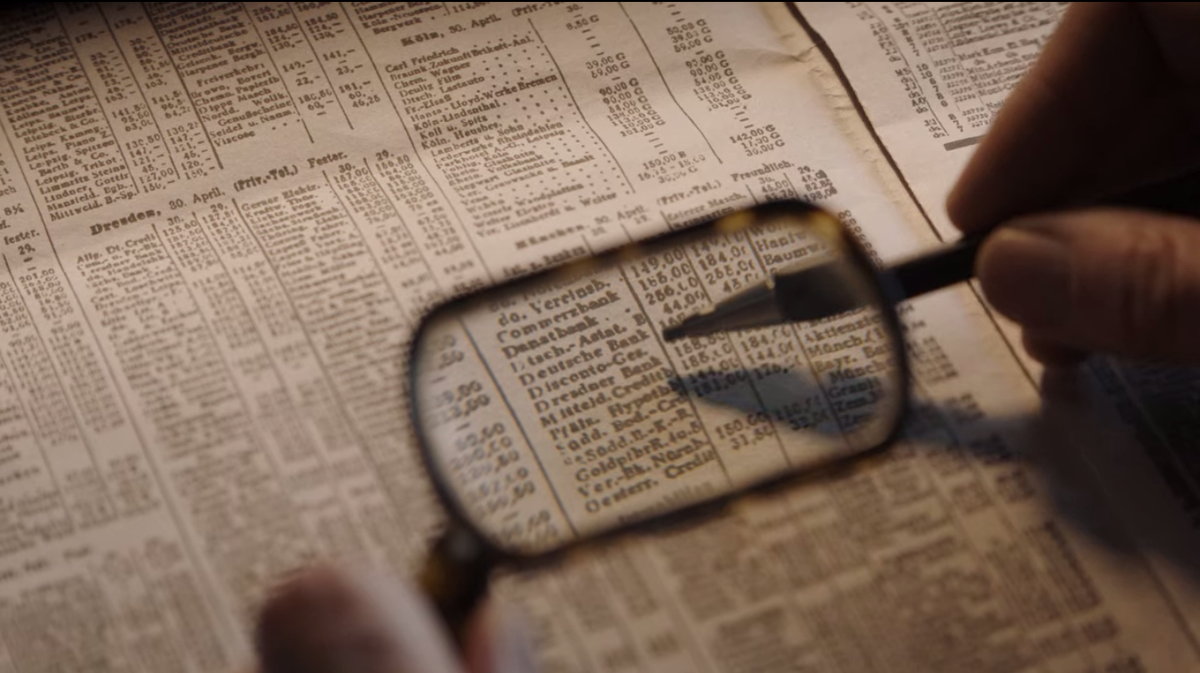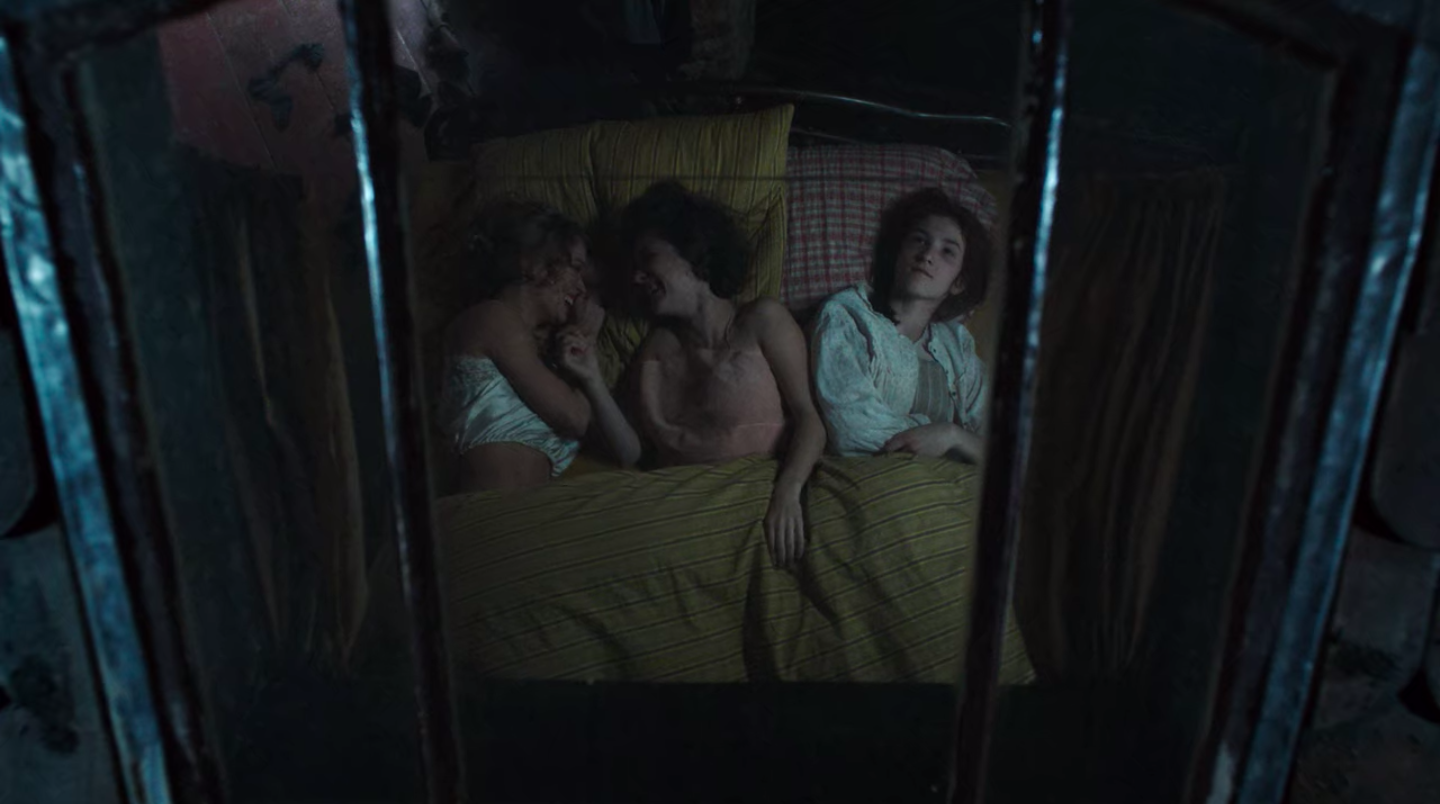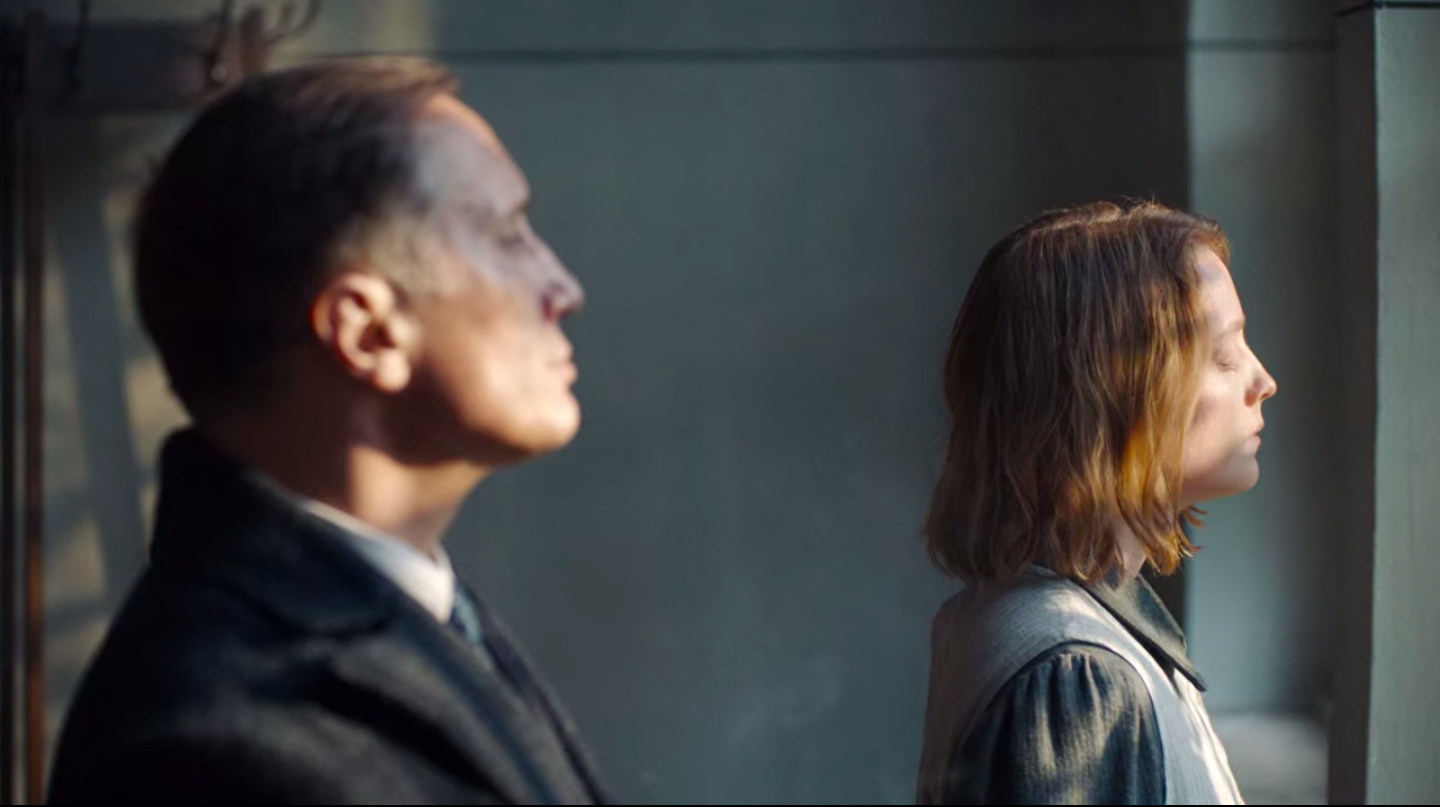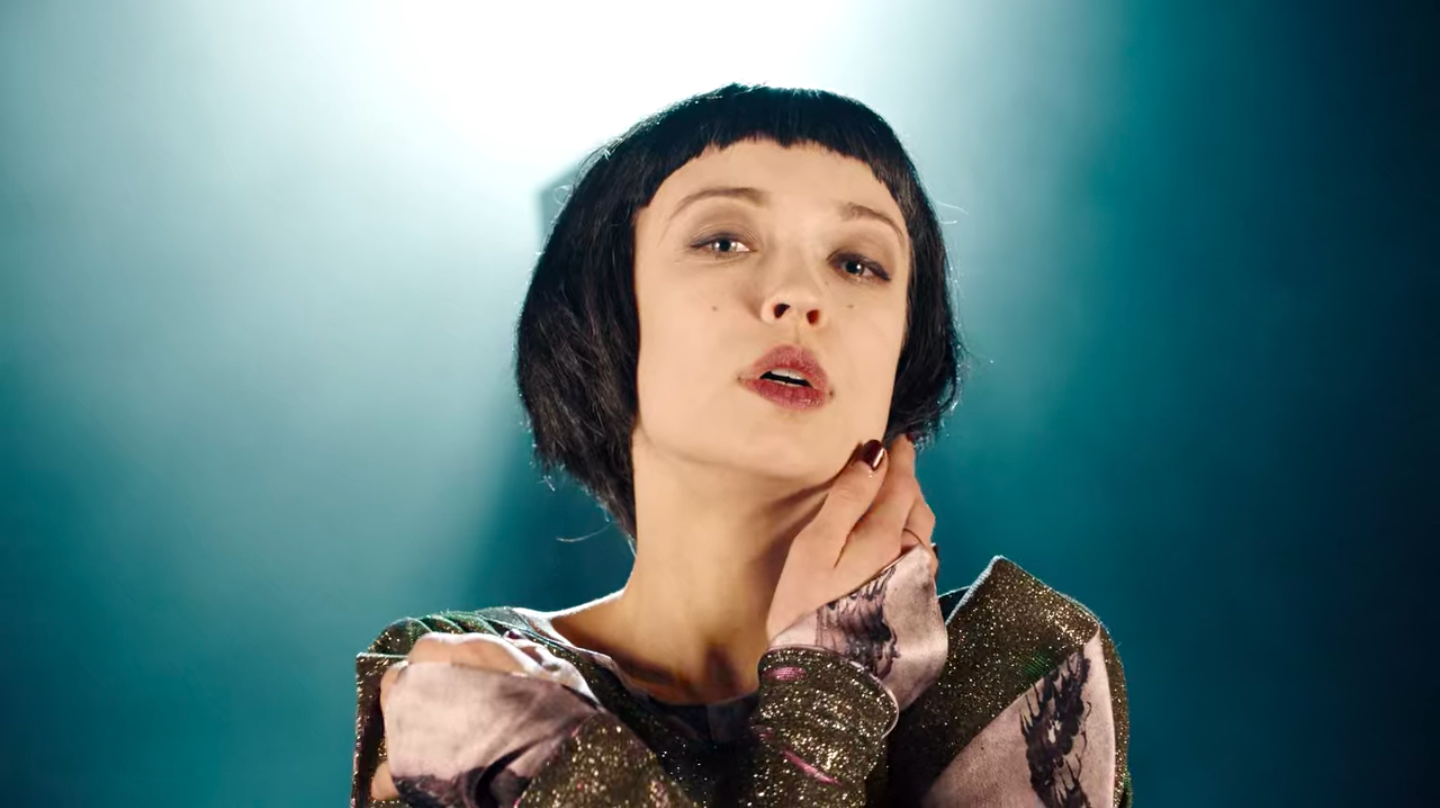Babylon Berlin: "Episode 19" and "Episode 20" (with Amelia Tate)
In which we got us a good old-fashioned murder mystery

(For the foreseeable future — aka as long as this quarantine lasts — Emily will be watching the critically acclaimed German drama Babylon Berlin, a neo-noir set in 1929 Germany. The series is available on Netflix in the United States. For every installment, she will be joined by a special guest. Today’s guest is Amelia Tate, author of a really terrific newsletter. Find her there or on Twitter.)

Emily: One wild thing about this season of Babylon Berlin is how it’s already juggling about 52 different plotlines. Normally, that would be cause for concern, but I trust this creative team, and I think they have help from the arc of history. When Nyssen, realizing that the entirety of the stock market is a house of cards, suggests that a little push could send it all toppling, you know that little push is about to arrive. (Though will Nyssen be the one to give it? We don’t know.)
But the center of the season is an old-fashioned murder mystery, with a ghostly killer. I have a kind of wild theory about who that killer might be. (Well, it’s my wife’s theory, but it’s a brilliant one.) I’ll share that later in the article with appropriate spoiler speculation text, but for now, I’m really digging the way there’s a new murder carried out by a seemingly supernatural ghost in a black coat, who can just show up wherever and whenever he’s needed to do some murderin’. This week’s victim: Tilly Brooks, who has the misfortune of stepping in for Betty Winter, then missing her big moment because Vera locks her in the dressing room and goes on to take the part.
Vera really takes center stage in some intriguing ways this week, including having a nice make out session with Lotte on the dance floor at everybody’s favorite queer club. I don’t know why I’m convinced Vera has an ulterior motive — probably because everybody on this show does — but she sure seems to be playing any and all sides effectively, and when she and Lotte collapse into bed alongside Toni at the end of “Episode 20,” I still want to believe it’s love. (Queer gals forever!)
I’m really fascinated by the borderline Hitchcockian obsession with doubles that begins to unfold here, with numerous “new” Betty Winters stepping into the shoes of the dead star, slowly driving Tristan (Betty’s husband) to greater and greater paroxysms of… something. He seems upset, but he also seems like he might be hiding some sort of deeper guilt. I may talk about this theme more in a bit, but I’d really love to hear if you have thoughts on it, Amelia.
This set of episodes also has a rich understanding of the ways that trauma warps and changes someone. The scene where Graf is first forcibly reminded of his past, then forced to perform a sex act on the archivist is gut-wrenching, and the entire Greta arc seems to be about this in some ways. But you can see echoes of trauma and sadness in almost every character this season — like Gereon! He’s a mess!
These episodes are mostly scene-setting episodes, getting us enmeshed in the world the season will surely unravel as we proceed. They’re good, of course, but they feel like ones that will have a little more to say once we’ve seen the full tapestry and know what the overall themes the show is exploring this year are. I will say that there’s something haunting about Greta being pushed to blame not the Nazis for the death of Benda but the Communists. Gereon and Graf are on the case, something that will surely result in the day being saved, right? They’re going to stop the rise of the Nazis? They have to!
What did you think of these episodes, Amelia? Am I correct that you’ve finished the season? How do these two fit into the overall picture (without spoiling, of course)? And is Gennat the best character on the show?
Amelia: I love Gennat! It’s pretty neat his character is based upon a real person, and he’s a good foil for Ullrich. He’s not perfect, as he often seems more concerned with the department’s publicity than the details of the investigation, but unlike many of his colleagues he’s more willing to give characters from less traditional backgrounds (such as Lotte and Graf) their fair shot.
I’m not going to lie, these episodes are not high on my list of the best episodes of the show. That isn’t to say that they aren’t very good, because they are. But being memorable isn’t their purpose. It’s a testament to this show that the scene setting episodes are still this good.
Yes, I’ve finished the season, as I couldn’t help myself. These episodes were even better the second time through, as moments that seemed inconsequential now reveal their full impact. For example there is a character detail regarding a certain detail oriented analyst that will end up playing a much larger role down the line than what you’d think just watching these episodes the first time through. I’m impressed (but not surprised) by how well the creative team keeps all the storylines moving.
I liked the scenes of Nyssen’s investigator interviewing all of the various working people buying stocks on debt, and the growing realization at how bad the situation was. As you said, we know that push is coming, and what that means for history, although maybe this time it’ll turn out differently!
I agree that Tristan seems to be shaken by something other than just the stress of having to act with the replacement of the murdered look-alike for his murdered wife. Beyond the stress of all the doubles, and the cursed production of the film, he comes off as high strung in the calmest of times. His whole discussion about the “other side of the mirror” could have multiple meanings, and many of them have nothing to do with him being a murderer. It’s not looking good for Tristan, as the clues keep mounting up that makes him at least suspicious. But beyond his guilt and/or innocence regarding the mysteries of this season, there is more going on for him than meets the eye.

As for Vera and Lotte, I rewatched their interaction in “Episode 20” just to double check, and unless Vera’s a better actress than I thought, she seems pretty genuine in her affection. On the other hand, it seems suspicious that she’d get interested in Lotte just as she is involved in a murder investigation. I don’t know, I would bet against them in the long term, but for the time being I choose to believe in those two crazy kids.
I’m looking forward to hearing your wife’s theory about who the killer is, as this is clearly not an open-and-shut murder case. Beyond that, I’m curious about your thoughts regarding some of the other things going on. How doomed are Böhm and his family? What about that mysterious package Lotte received from her old neighbor? Most importantly, how did I go this long without mentioning the good Dr. Völcker, my favorite communist?
Emily: Poor fuckin’ Böhm! My dude is so confident in his future wealth that he should really know he’s a character being used for dramatic irony in a piece of historical fiction. (True story: Any time I feel incredibly certain of impending good fortune, I wonder if I’m a character being used for dramatic irony in a piece of historical fiction. A recent example involves a really exciting professional development being squashed for now by… a world-historical global pandemic.) That scene where he assures his family things are only gonna go up and up and up for them is crushing, knowing that the Depression is coming in a matter of weeks. After all, in case we’ve already forgotten, we opened this season on Gereon moving among the flutter of stocks falling to the ground.
Meanwhilst, the stuff in the prison is not wholly convincing to me right now. I know that Greta’s whole function as a character is to show us the swirl of politics underpinning everything happening in Berlin at this moment in history, but eventually that becomes too much to heap on one character. The scenes where the Communists threaten her after she changes her testimony to accuse the Communists and not the Nazis feel like leftovers from an unused Orange Is the New Black script, even though I’m happy to have my Communist sweetheart Dr. Völcker back. (Call me, Dr. Völcker!)
I also like that the show doesn’t really bother to tell you why she’s ended up in jail. You can assume it’s for threatening Gereon’s life at the end of season one or just part of a broader anti-Communist crackdown. Either can be true. What I don’t really like here is the resurrection of Greta’s child as a plot device. I assumed the kid was long gone when the series began, and now she’s being forced to watch as a police department adopts the baby and uses the kid to further political goals? I suspect this is all headed somewhere, but also, I still find Greta hard to care about because she’s more of a plot function than a character. (I do like the way she watches things with an unflinching gaze, though. Good for her.)

I want to return to the “other side of the mirror” and the reveal that there’s some sort of occultist shit going on attached to this season’s case. Shades of True Detective here, but also, I love this sort of thing, so why not? I desperately want to see Gereon and Lotte in, like, cultist robes as they infiltrate a human sacrifice or something.
But what we don’t quite have a full grasp of yet is why this movie is so important to whatever plot the villains this season are engaging in. By this point in season one, we at least knew that mysterious train car was full of gold, which turned out to be a misdirect but still gave us something to hang on to. This season, all we have is that there’s a weird ghostly figure wearing one of the movie’s costumes to do some murders. I’m into it, but I’m waiting for the stakes to become more tangible than “the Armenian will lose a bunch of money.” I can sort of see where these loose ends are going to start to tie together, but the show hasn’t yet given me all of the pieces I need to put this puzzle together or even to really speculate on what the picture will look like.
Not yet, at least.
I’m going to share my “who the killer is” theory very, very soon, I promise, but first, I want to know what you think of Gereon meeting his brother down in the sewers, as well as the whole Helga side of things. She’s a pretty key example of my main issue with a lot of this season so far, which is that I’m interested and intrigued but not yet sure enough of the ground I’m standing on to know what to think. Though, come to think of it, that describes global society in the weeks leading up to the stock market collapse, so this might be a deliberate strategy.
Amelia: I’m conflicted as to whether not having that solid ground to know where to stand on is a deliberate choice, or just an effect of so many storylines going on at the same time.
I think you can make a case it’s the former, as the show distracts us with Helga, and the central mystery, and Lotte and Vera, all as the days keep getting closer to October, 1929 and the horrible consequences that await beyond that dark day. (I, too, can get suspicious when things are going very well that the other shoe is about to drop. Granted, I think I’m better about this these days, but it’s still there.)
I like how this is a show that deals with the major historic events of Germany in the late 20s and has Gereon go to the sewers to be hypnotized by his presumed dead brother. I don’t really know where all of this is supposed to be going beyond curing Gereon’s PTSD, giving him another connection to the Armenian, and alienating him from Helga.
Speaking of Helga, she’s here, but I don’t ury know why she matters, or how much. It's too bad. I like her as a character. and setting her up with a potential relationship with Nyssen might pay dividends down the line. It also seems as though the show is setting up her separation from Gereon to play a role in where Moritz is going. But for now she just seems to be taking up space.
I was thinking the same thing about the scene in the cafeteria at the prison being a castoff from Orange is the New Black. And yeah, using Greta’s son to keep her in line doesn’t sit well with me, for the same reason you mentioned. It’s definitely heading somewhere, not only at stoking the flames of conflict between the Nazis and the Communists, but also because it suits Wendt’s own agenda to keep her in prison. I just wish that it was more interesting to watch.
There is definitely some occult shit going on with the movie production at the center of the murder mystery. How occult it’s going to get remains for future episodes. It’s obvious why the publisher of Tempo would prefer this story (with all of its potential for lurid and striking pictures) over the story of the rearming Luftwaffe. In retrospect the latter’s importance sticks out to us 91 years into the future, so much so that I almost yelled at the screen to get the publication to pay more attention to Katelbach and his story!
Before I turn it back over to you, Emily, I have to address something very important. I’m happy that Lotte is finding some success this season in her chosen career. Being on the job trailing the season’s mystery demands a more flexible, practical hat. That being said, I still miss the hats from the previous seasons, they were something special.

Emily: Yes, there is something very jumbled and wild about this season so far, but I have to admit that part of that stems from just how many elements of the story were in play at the end of season two. There’s something thrilling about, say, Katelbach parachuting in to the story again from out of nowhere, or Lotte never being able to escape her past, or the Armenian calling in a favor from Gereon, to remind us of that whole deal again. The best TV shows usually feel like they take place in a consistent world, and Babylon Berlin has that quality in spades, even when I wonder where things are going.
(And lest it sound as though I am complaining about this season, I’m not. Watching these episodes was spell-binding, and it was only in retrospect that I realized I didn’t quite know where all of this was supposed to be headed. I had so much fun with these episodes on a scene-by-scene basis that I missed how the big picture was a little muddled.)
So, it’s time for my big theory (aka my wife’s big theory) as to what is happening this season: She thinks that Gereon has been brainwashed by the psychiatrist who may or may not be his brother, and thus, he is carrying out at least some of the ghost murders. When the time comes, we will learn that these murders are happening thanks to a number of brainwashed patients who will roughly symbolize the way fascism turned many of the country’s own minds against themselves. This was foreshadowed by the way Gereon forgot that he shot Father Joseph all the way back at the end of season one.
Is this right? Probably not. But that I think it’s plausible should indicate just how wild and elastic the reality of this show is, even if it too rarely has some great hats for Lotte to wear. (I kind of liked her little patchwork-y one this week.)
Anyway, Amelia, you said you’ve watched this full season, so tell me: How did it stack up to the first two for you, and how excited should I be for the Great Depression to hit?
Amelia: I really enjoyed the episodes as I watched them both the first and second times, and really only once I took the time to think about the big picture of the season did I realize that it was a bit jumbled. Yet I agree with you about the consistency of the show, as messy as it might be.
I really like your wife’s theory about the murders, but am not at liberty to say how close to the mark it is. All I’ll add is that having the answer will shed new light on some of the things that happen in these episodes and help clarify what’s going on. Is that appropriately vague? I think so.
Also, it’s been a given since the first episode of the show, but this is just a beautiful series. The costumes, the sets, the lighting, the music, everything looks and sounds so great. It all brings Berlin in 1929 alive in a way that just reading about it in a book just can’t quite do, and helps paper over some of the messier aspects of the show.
All in all, I really liked season three, and I think it’s my favorite season. Is it as tight as season two? I don’t think so, but I don’t really mind a bit of a mess, especially when the rest of it is as good as this is. The show goes to some places both expected and unexpected from here. The last two episodes, especially, are something else, and there are some great moments in store. I’m looking forward to hearing your thoughts on the season once you wrap it all up and will certainly have more to say when I no longer have to worry about spoilers.
Emily: Wow, I hope the bull and bear statues from the season’s opening scene come to life! Where can people find you, Amelia?
Amelia: It’s been a blast talking to you about Babylon Berlin, Emily! These days you can find me at my newsletter, or on Twitter.
Emily: Thank you so much for joining me! Next week, we reach the season’s midway point, and hopefully Gereon and Charlotte finally kiss!




